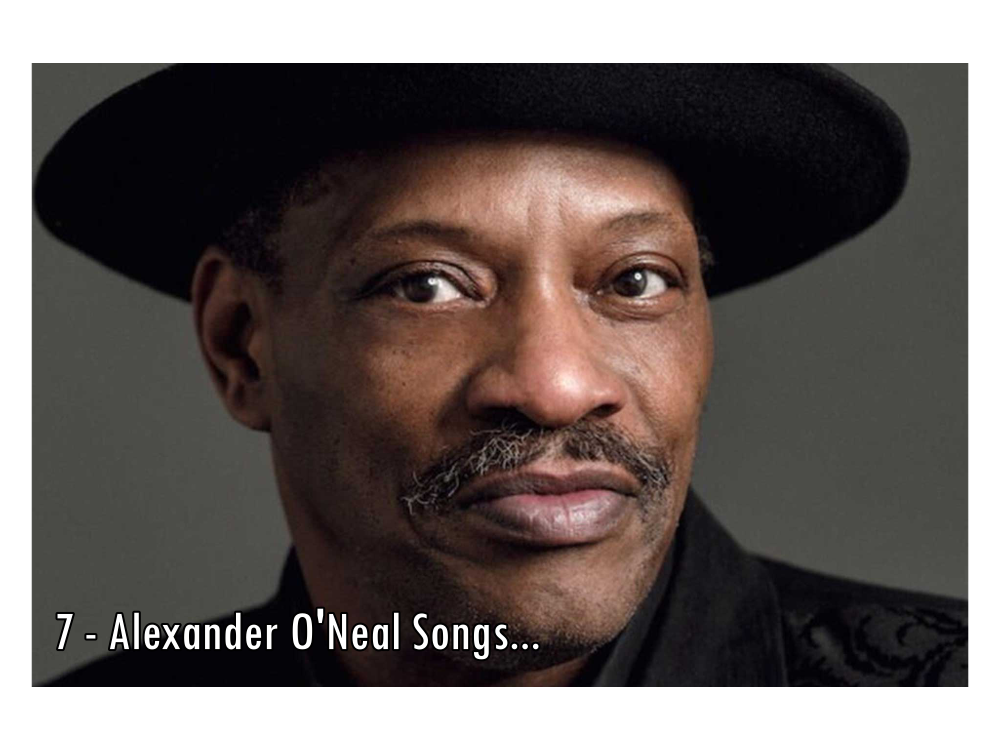(ThyBlackMan.com) When I think about the voices that shaped the sound of grown-up R&B, Alexander O’Neal is always near the top of the list. His music didn’t just fill dance floors or top charts—it tapped into the emotions that so many of us wrestle with: heartbreak, trust, longing, love, and self-worth. O’Neal sang like a man who had lived through it all, and his songs have this uncanny way of speaking directly to your soul.
What makes his catalog special is the range. One moment he’s vulnerable and aching, the next he’s strutting with confidence and calling out the nonsense. He could be tender without being soft, strong without being arrogant. And through it all, that rich, resonant voice carried the weight of real emotion. Whether you’re discovering him for the first time or revisiting his work with fresh ears, these seven songs show exactly why Alexander O’Neal’s music still hits home—even decades later.

1. “If You Were Here Tonight”
“If You Were Here Tonight” is perhaps O’Neal’s most recognizable ballad and a masterclass in emotional vulnerability. Written by Monte Moir—formerly of The Time—the track rides a sparse arrangement of gentle synths, haunting drum machines, and ambient textures that never distract from the song’s emotional weight. Its minimalistic soundscape leaves space for the heartache to settle in, making the track feel incredibly intimate. From the opening notes, O’Neal pulls you into a story of longing and quiet devastation. This isn’t just a song; it’s an emotional confession set to music.
O’Neal’s vocal performance here is one of his most nuanced. He doesn’t go for vocal theatrics—instead, he leans into restraint, letting every breath, pause, and run carry emotional significance. His delivery is thoughtful, never rushed, giving each line the gravity it deserves. This is a man baring his soul, and that vulnerability resonates more deeply because it feels so unfiltered. At a time when many male R&B singers leaned into bravado or suave seduction, O’Neal gave the world a raw portrayal of romantic grief.
This ballad is timeless because its message is universal. Even decades later, it fits seamlessly into playlists centered around reflection, heartbreak, or quiet nights alone. It’s the type of song that lives on in memory, playing in the background of breakups, long drives, and late-night contemplations. “If You Were Here Tonight” still holds the power to move listeners in 2025 as profoundly as it did in 1985—proving that true emotion never goes out of style.
2. “Fake”
If “If You Were Here Tonight” showcased O’Neal’s softer side, “Fake” was him in full swagger mode. Released in 1987 as part of the Hearsay album, “Fake” is bold, funky, and oozing with personality. Produced by the legendary Jimmy Jam and Terry Lewis, the track is a shining example of the Minneapolis sound they helped define. It’s built on elastic basslines, hard-hitting drum programming, and those trademark synth stabs that made so many of their productions unmistakable. From its infectious groove to its humorous yet pointed message, “Fake” stands as one of O’Neal’s most fun and fearless singles.
What makes this song so iconic isn’t just the production—it’s O’Neal’s charisma. He delivers every line with a blend of smirk and scowl, painting a vivid picture of someone fed up with superficiality. His tone balances mockery with frustration, making the song feel like both a dance track and a dramatic monologue. There’s a theatrical quality to it, as if O’Neal is performing the role of a wronged lover in a stylish R&B opera. And the backing vocals, layered with precision, add to the sense of rhythm and confrontation.
In an era dominated by curated social media personas and filtered realities, “Fake” feels eerily prophetic. It’s not just a song about a superficial lover—it’s a commentary on the masks people wear, and the exhaustion of trying to love someone who’s too wrapped up in image. Whether you hear it at a retro dance party or blast it in your car for a solo jam session, “Fake” delivers funk, truth, and attitude in equal measure. It remains one of Alexander O’Neal’s most danceable and sharp-tongued classics.
3. “Criticize”
“Criticize” is the track that took Alexander O’Neal’s confident persona to new heights. A highlight of the Hearsay album, it doubled as both a commercial success and a defining artistic statement. With its aggressive groove, choppy synth arrangements, and percussive vocal lines, the song struck a chord with fans of funk, pop, and R&B alike. Once again, Jimmy Jam and Terry Lewis crafted a musical landscape that was both radio-ready and emotionally charged, giving O’Neal the perfect vehicle to vent his frustrations in style.
This song operates on multiple levels. On the surface, it’s a high-energy dance track perfect for any retro club playlist. But beneath that, it’s a fierce declaration of independence. O’Neal is not just calling out a critical partner—he’s reclaiming his space. His vocal delivery is assertive and unapologetic, pushing back against constant judgment with righteous force. There’s something empowering about the way he voices boundaries, reminding listeners that self-worth isn’t up for debate. The urgency in his tone makes it more than just a catchy hook—it becomes an anthem for personal liberation.
“Criticize” remains incredibly relevant in today’s climate where emotional well-being and self-empowerment are topics of everyday conversation. Whether in relationships, workplaces, or even creative endeavors, the pressure to meet unrealistic standards is ever-present. This track offers a sonic shield for anyone who feels unfairly scrutinized. More than three decades later, its defiant beat and empowering message still feel fresh, vital, and undeniably funky. Alexander O’Neal didn’t just make a bop—he made a battle cry dressed in synths.
4. “Sunshine”
“Sunshine” is one of the most overlooked gems in Alexander O’Neal’s early catalog, but its beauty lies in its understated nature. While O’Neal is often celebrated for his more intense ballads or assertive funk tracks, this song presents another side of his artistry—a peaceful, affirming celebration of love. The song’s title couldn’t be more appropriate: its arrangement radiates warmth through glowing synth layers and mid-tempo grooves that evoke the feel of a breezy summer afternoon.
What makes “Sunshine” so appealing is its emotional tone. O’Neal is almost reverent in his delivery, gently offering thanks for a partner who brings light into his world. His vocal approach is notably softer here—not because he lacks conviction, but because the love he’s singing about doesn’t require grand gestures. This is about security, comfort, and emotional peace. The harmonies hover in the background like rays through a curtain, letting O’Neal’s voice sit front and center without overwhelming the listener.
“Sunshine” is a track that grows richer the more you play it. It’s not built for showy performances or dramatic climaxes. Instead, it offers consistency and a sense of spiritual uplift. In a modern musical landscape filled with love songs focused on drama or turmoil, this track stands out as a refreshing reminder that sometimes the most powerful love is the kind that simply makes you feel at home. Whether you’re reflecting on a lasting relationship or dreaming of one, “Sunshine” offers a soft and soothing escape.
5. “What’s Missing”
“What’s Missing” stands as a poignant moment on O’Neal’s self-titled debut—an introspective, emotionally-layered ballad that digs into the discomfort of emotional disconnect. It’s not a song filled with high drama or betrayal; instead, it captures a subtler, more common reality: two people in a relationship that lacks an intangible spark. The production, full of ambient synths and a restrained rhythmic pulse, mirrors the slow unraveling of a relationship that once held promise.
Alexander O’Neal delivers a vocal performance that’s both pained and measured. He doesn’t scream or beg; instead, he questions. That sense of emotional inquiry gives the track its power. There’s a noticeable weariness in his voice that speaks volumes about the emotional labor of trying to fix something that may be fundamentally broken. This is O’Neal in reflection mode, and the vulnerability is compelling. He allows space for contemplation, encouraging the listener to sit with their own thoughts of what may be missing in their own emotional lives.
Musically, “What’s Missing” exemplifies the best of mid-’80s R&B balladry. The production is tasteful and cinematic without being overwrought, giving the listener time to absorb the mood. In a playlist filled with break-up anthems or love declarations, this track occupies that difficult middle space where things aren’t ending, but they’re certainly not thriving either. It’s the kind of song that feels especially resonant during quiet, lonely evenings—when questions echo louder than answers.
6. “The Lovers”
By the time “The Lovers” was released, Alexander O’Neal and Cherrelle had already established a reputation as one of the most magnetic duos in R&B. Following their success with “Saturday Love,” this track served as a mature and emotionally fraught sequel—shifting the tone from innocent flirtation to complex emotional fallout. What makes “The Lovers” especially striking is how its bright, danceable production contrasts with the tension in the lyrics. It’s a contradiction that works beautifully, echoing the way people often mask relationship problems behind smiles and celebrations.
The chemistry between O’Neal and Cherrelle is electric. Their vocal interplay is less about harmony and more about emotional exchange—they argue, they plead, they reminisce. It feels like a dramatic scene unfolding in real-time, set to a groove. Cherrelle’s sharper delivery balances O’Neal’s rich, baritone presence, creating a believable push-and-pull dynamic. You get the sense that both characters are right in their own way, making the song even more layered and real.
Jimmy Jam and Terry Lewis crafted a track that is both radio-ready and narrative-driven, giving “The Lovers” lasting replay value. In today’s world of romantic ambiguity and unspoken tension, the song still feels current. Whether you’re watching a love story play out in a TV drama or living one yourself, “The Lovers” provides a soundtrack for those messy, in-between moments of passion and pain. It’s a reminder that love, even when complicated, can still sound absolutely fantastic.
7. “All True Man”
By the early ’90s, R&B was shifting away from the glittery synths of the ’80s into a more grounded, adult contemporary space. “All True Man” captured that transition perfectly while showcasing Alexander O’Neal’s maturity as both a vocalist and an interpreter of grown-up themes. The production—less experimental but deeply soulful—leans on sturdy arrangements, slow-burning instrumentation, and a confident beat that mirrors the self-assurance in the lyrics.
Vocally, O’Neal sounds seasoned but still vibrant. He doesn’t need to convince the listener of his authenticity; it radiates in every phrase. There’s a smooth conviction in his performance that speaks to a man who has lived, learned, and come out stronger. This isn’t about seduction—it’s about substance. “All True Man” is less about proving oneself to a lover and more about declaring emotional availability, dependability, and resilience. It’s an anthem for men who are ready to be counted on, not just adored.
The song’s themes still resonate today, especially in a culture where emotional maturity and stability are often underrated in popular music. “All True Man” offers a counter-narrative to fleeting romance and superficial relationships—it celebrates the quiet dignity of a partner who shows up and stays solid. If you’ve ever wanted a song that affirms the beauty of consistency in love, this is it. It belongs in the same conversation as classics from Luther Vandross and Peabo Bryson, continuing the tradition of R&B as music for the grown and grounded.
Listening back to these Alexander O’Neal songs now feels like flipping through an old photo album—one filled with joy, heartbreak, and everything in between. His voice brings back memories and emotions you thought you had tucked away. That’s the power of his music. It doesn’t just play—it stays. It reminds us of what it feels like to fall hard, to question love, to dance off pain, or to finally find someone who’s truly real.
In a world where R&B often leans too heavy on trends and forgets about timeless storytelling, O’Neal’s songs still shine with honesty and heart. These tracks aren’t just nostalgic—they’re necessary. And if you’ve ever loved hard, lost deeper, or just needed a groove to get you through, chances are Alexander O’Neal already sang your story.
Staff Writer; Jamar Jackson
This brother has a passion for sports, poetry and music. One may contact him at; JJackson@ThyBlackMan.com.

















Leave a Reply